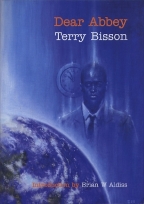Dear Abbey
Terry Bisson
PS Publishing
UK First Edition Hardcover
ISBN 1-902-88076-5
Publication Date: 10-15-2003
108 Pages; $40.00
Date Reviewed: 12-01-03
Reviewed by: Rick Kleffel © 2003

REFERENCES
COLUMNS
|
|
|
Dear AbbeyTerry BissonPS PublishingUK First Edition HardcoverISBN 1-902-88076-5Publication Date: 10-15-2003108 Pages; $40.00Date Reviewed: 12-01-03Reviewed by: Rick Kleffel © 2003 |
|
|
REFERENCES |
COLUMNS |
It's only a fluke, really, that genre fiction is differentiated by the subject of the work. Thus, we have the mystery genre for stories about crime, the romance genre for stories about love, the science fiction genre for stories about extrapolations of a scientific nature, and so on. These divisions have come to define the fiction within them. It would be equally logical to divide fiction not by the content, but by the emotional tone, and some existing genres speak to that idea -- the horror genre, for example, which is not so much about the subject but the emotional tone of the work. Were genre fiction differentiated by emotional tone rather than subject, we would have happy fiction, angry fiction, sad fiction and as a special subgenre of sad fiction, melancholy fiction. Were that to be the case, Terry Bisson's 'Dear Abbey' might be a likely candidate for this year's Melancholy Novella of the Year award. 'Dear Abbey' lifts a science fiction trope, time travel, but harnesses it in the service of melancholy. The time travel and Bisson's potent visions of the future are just engines in a prose vehicle that has but one powerful emotional destination -- that sweet, sad feeling of loss and nostalgic helplessness, melancholy. It's an interesting departure for a writer known best for his hilarious short story 'They're Made of Meat', arguably the most copied-without-permission piece of fiction on the Internet. Unsurprisingly, the two are more alike than one might at first suspect.
Cole is a black professor at an undistinguished college; his office-mate, Lee, a physicist, is a Chinese political refugee from Texas. They alternate use of the same desk, and have no real connection, beyond their mutual admiration of Edward Abbey's 'The Monkey Wrench Gang'. When Cole shows up one day during Lee's time segment, Lee drags Cole to a bar, and then to the end of time.
Bisson is so unconcerned about the science fiction aspects of time travel that he simply has Lee program a Palm Pilot with some "magic numbers", sit on a swing set and voila, the future is now. This is by no means a hard science fiction story when it comes to time travel, even as more and more physicists admit it might be possible. Bisson is much more rigorous when it comes to the futures that his protagonists explore. They travel first one year, then five hundred, one thousand, then ten thousand, then millions and ultimately billions of years in the future. They don't have control of their destinations, which are being selected by the 'Old Ones', residents of the most distant future who are trying to turn their journey into a lesson. What they find is not the staple of science fiction futures.
Cribbing a line from J. G. Ballard's 'Memories of the Space Age', Bisson's voyagers do not find a future in which mankind has conquered the galaxy. Instead, they find worlds in which our actions and inactions as regards the earth's environment have played out with consequences both somber and sobering. From cannibal seals to 30th century Paris, from the day after tomorrow until the final hour of mankind's existence, Cole and Lee experience a series of very scientifically plausible futures. Bisson, having handed his protagonists magical time travel, concentrates the scientific aspects of his science fiction on showing what will happen to the earth if no magic technology intervenes to send us out into space or repair what we've done to both the earth and our own minds. Mankind's attempts to reach the stars are inconclusive. Those who leave never return or make contact with the inhabitants of the earth. Humanity, having sown the seeds of disaster, accepts with resignation what it reaps. There are no master architects whose plans can rescue and redeem us. Sometimes much of humanity dies; sometimes, much of humanity lives. Individuals expire, the race goes on and nobody ever wins.
Bisson is a master at architecting a seemingly accurate vision of the future that supports his melancholic mood. Helpful guides to whatever "time slice" of the future his viewpoint characters are visiting concisely convey each scenario, no matter how complex. The narrative drive is sustained by the mystery of the identity and the purpose of the "Old Ones" who are creating a show for Cole and Lee. The "Old Ones" ensure that the pages are regularly turned, because the rather depressing visions that Bisson supplies are not an invitation to self-affirming joy. 'Dear Abbey' -- that's Edward Abbey -- is an effective polemic on the current course of our civilization. As seen by Bisson, it's not a road that anybody is going to look forward traveling.
While Bisson is strong on mood, he sacrifices plot and characterization in the process. But then, that's rather the point of this glum book. Who we are and what we do, ultimately, simply does not matter. Moreover, that we are, in the end, simply does not matter. Bisson's meditation on the future of mankind comes to a perilous conclusion, and offers only the hope of action now. But expect to be depressed for a few days before stirring yourself to action. 'Dear Abbey' shows that serious thoughts about the future can have unintended consequences. Strip away the fantasy, the spin, and what you have left is meat on dirt. It's not a pretty picture -- nor is it inaccurate. Just sad, really.